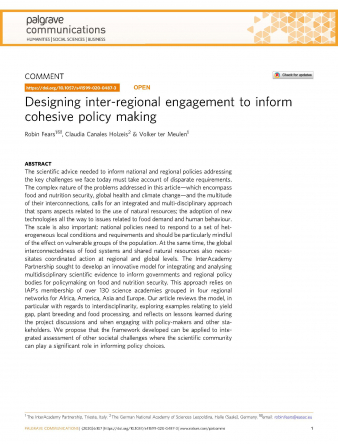The scientific advice needed to inform national and regional policies addressing the key challenges we face today must take account of disparate requirements. The complex nature of the problems addressed in this article—which encompass food and nutrition security, global health and climate change—and the multitude of their interconnections, calls for an integrated and multi-disciplinary approach that spans aspects related to the use of natural resources; the adoption of new technologies all the way to issues related to food demand and human behaviour. The scale is also important: national policies need to respond to a set of heterogeneous local conditions and requirements and should be particularly mindful of the effect on vulnerable groups of the population. At the same time, the global interconnectedness of food systems and shared natural resources also necessitates coordinated action at regional and global levels. The InterAcademy Partnership sought to develop an innovative model for integrating and analysing multidisciplinary scientific evidence to inform governments and regional policy bodies for policymaking on food and nutrition security. This approach relies on IAP’s membership of over 130 science academies grouped in four regional networks for Africa, America, Asia and Europe. Our article reviews the model, in particular with regards to interdisciplinarity, exploring examples relating to yield gap, plant breeding and food processing, and reflects on lessons learned during the project discussions and when engaging with policy-makers and other stakeholders. We propose that the framework developed can be applied to integrated assessment of other societal challenges where the scientific community can play a significant role in informing policy choices.
Fears, R., Canales Holzeis, C. & ter Meulen, V. Designing inter-regional engagement to inform cohesive policy making. Palgrave Commun 6, 107 (2020) https://doi.org/10.1057/s41599-020-0487-3


